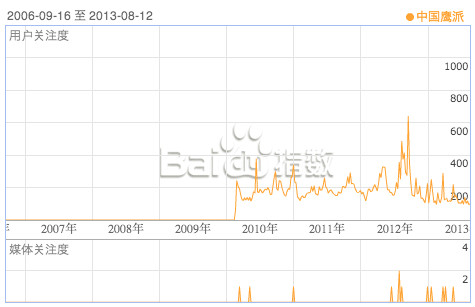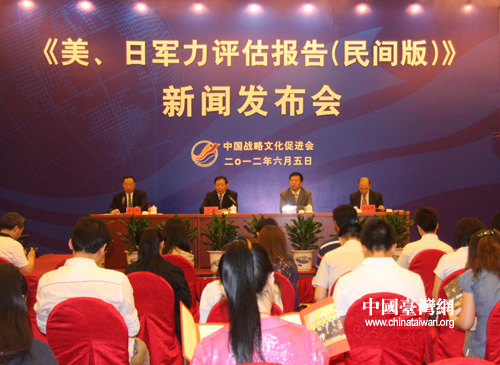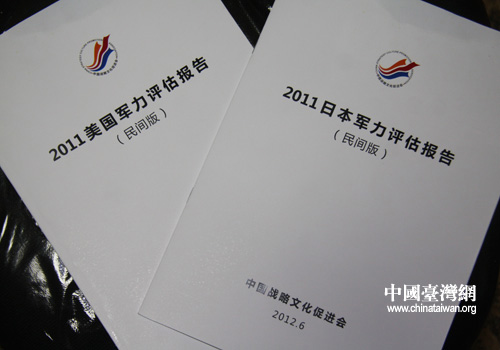Propaganda as Policy? Explaining the PLA’s “Hawkish Faction” (Part Two)
Posted: August 13, 2013 Filed under: Academic debates, Diaoyu, Fake PLA generals?, Global Times, Ministry of Foreign Affairs, PLA & PLAN, South China Sea, State media | Tags: Baidu Index, China-Philippines relations, Chinese foreign policy, Chinese media, Chinese military, Chinese nationalism, Chinese public opinion, 环球网, 环球时报, 罗援, Dai Xu, deterrence, Diaoyu, Diaoyu Islands, 钓鱼岛, 鹰派, 黄岩岛, Global Times, informatized warfare, Jamestown Foundation, Luo Yuan, military propaganda, PLA hawks, propaganda, scarborough shoal, Senkaku, Senkaku Islands, Sino-Japanese relations, south china sea, 忧患意识, 戴旭 3 CommentsHere is Part 2 on the PLA hawkish faction from China Brief, with added links to sources, and a couple of graphs from the utterly awesome Baidu Index (big hat tip to Kaiser Kuo).
I’d also like to add my thanks to Xuan Cheng, John Garnaut, James Barker, Mark Stokes and Taylor Fravel for discussions and tips on this topic. They don’t necessarily agree with the content of the article.
~
Propaganda as Policy? Explaining the PLA’s “Hawkish Faction” (Part Two)
Publication: China Brief Volume: 13 Issue: 16
August 9, 2013
By: Andrew Chubb

Rise of the hawks: searches for “China hawkish faction” by logged-in Baidu users since 2008. I’m requesting further info from Baidu regarding the extremely low pre-2010 numbers. One point that can be made with confidence is that user interest in the “Chinese hawkish faction” peaked during the Scarborough Shoal and (especially) Diaoyu Islands crises.
If outspoken Chinese military officers are, as Part One suggested, neither irrelevant loudmouths, nor factional warriors, nor yet the voice of the People’s Liberation Army (PLA) on foreign policy, and are instead experts in the PLA-CCP propaganda system, then what might explain the bad publicity they often generate for China? This article explores how the activities of China’s military hawks may contribute to the regime’s domestic and international goals. On a general level, the very appearance of a hawkish faction—the “opera” that Luo Yuan has described—serves the domestic purposes of promoting national unity (Global Times, May 4). By amplifying threat awareness and countering perceived Western plots to permeate the psyche of the Chinese populace and army, the “hawks” direct public dissatisfaction with the policy status quo away from the system as a whole.
In specific crises, such as the standoff at Scarborough Shoal last year or in the wake of the Diaoyu Islands purchase, hard-line remarks from uniformed commentators serve to rally domestic public opinion behind the prospect of military action, instil confidence in the PLA’s willingness to fight over the issue and deter China’s adversary. By amplifying the possibility of otherwise irrational Chinese military action and inevitable escalation should Beijing’s actions be interfered with, they have contributed to a thus-far successful effort to convince the Philippines and Japan to accept the new status quo around Scarborough Shoal and the Diaoyu Islands.
Luo Yuan’s US-style military report, and difficulties for Dai Xu
Posted: July 20, 2013 Filed under: PLA & PLAN, Weibo | Tags: China Strategy Culture Promotion Association, Chinese army propaganda, 罗援, 罗援少将, Dai Xu, external propaganda, 龙韬, Long Tao, Luo Yuan, PLA, PLA political work, propaganda, Taiwan Affairs Office, Weibo, 戴旭, 中国战略文化促进会 1 Comment
Press conference launching China Strategy Culture Promotion Association’s 中国战略文化促进会 2011 reports on US and Japanese military developments
Here is an actual weblog post — a log of what one reads on the internet — rather than the usual rambling speculative essay.
Luo Yuan’s think tank, the “China Strategy Culture Promotion Association” (中国战略文化促进会), yesterday released separate reports on the “military power of the US and Japan”.
Curiously, given it’s supposedly an non-governmental think tank (民间智库), the Global Times quoted China Foreign Affairs University’s Su Hao calling the reports “strong and timely responses to the inaccurate remarks in the US annual report on China’s military and the Japanese Ministry of Defense’s recent white paper” (emphasis added).
The report has been given lots of coverage in the Chinese-language media. Chinese radio bulletins yesterday were reporting on the report before it was even released.
The radio also mentioned that this year’s reports will be issued in English. I hope this is true, because it looks to be packed with highlights:
The reports pointed out that neither the US nor Japan had enough transparency regarding their military budgets.
[…]
The report concluded that Japan has strengthened its defense in its southwest islands and was preparing to take over the Diaoyu Islands by force in the future and intervening in any potential conflict in the Taiwan Straits.
Luo Yuan himself was quoted:
“We need to prepare for the worst [situation],” Luo said, adding that China should be well equipped.
This is the second year the think tank has released these reports. Copies of last year’s report carried the term “public version 民间版” on the cover, as pictured at the top, which seems to suggest there also exists some kind of restricted-circulation government version. If so, the China Strategy Culture Promotion Association looks like a good analogue of Luo Yuan’s own roles, at the intersection of military intelligence gathering, public diplomacy, propaganda work, and Taiwan affairs.
Note the watermark on the above pictures, which are taken from the think tank’s own website here. Chinataiwan.org is a website of the PRC State Council Taiwan Affairs Office, which Luo Yuan’s father Luo Qingchang directed in the 1970s and early 1980s.
* * *
I stumbled across a couple of rather astonishing little Dai Xu tidbits a couple of weeks back.
1.) According to China Intellectual Property News, Dai Xu sued a Hong Kong magazine Wide Angle Lens《广角镜》 and others including a Beijing airport newsagent, for lifting 52% of the 2011 Long Tao article calling for a South China Sea war. He demanded withdrawal of the magazine from circulation, apologies, compensation of ¥200,000. Judgement was handed down in January this year. He was awarded……wait for it…….¥240.
Among other things, i guess this shows Colonel Dai is not that well-connected.
2.) A sharp-witted blogger has outed Dai Xu for writing a preface, under his penname “Long Tao”, to his own chapters, in a book edited by him. Of one Dai Xu chapter, “Long Tao” asserts that “this piece can be called the modern-day Strategies of the Warring States 《战国策》” and that “Dai Xu has continued his consistent style of speaking the truth . . . on national strategy, Dai Xu’s viewpoint is deafeningly clear, and manifestly superior”. In the other self-preface, Long Tao says the following article “will receive the support of the majority of Chinese people and Chinese military personnel . . . an incomparably correct position . . . nobody has ever explained important theoretical problems so clearly, correctly, reasonably and vividly”.
Here we see essentially the same self-wumao tactic as Luo Yuan got caught employing on weibo a few months back. A post appeared on Luo’s weibo account, praising Luo Yuan’s superb analysis of the North Korean problem, and declaring him “the most popular military commentator on television”.
The Major General claimed he claimed his account had been hacked, but Kai-fu Lee certainly wasn’t buying it. He did, however, offer Luo some expert advice: “Although you can use different browsers to operate multiple weibo accounts, the premise is that each browser must be logged into a different account!”
A “strategic communication” with India, via Luo Yuan?
Posted: July 6, 2013 Filed under: Academic debates, China-India, PLA & PLAN | Tags: AK Antony, Chinese military, diplomacy, hawkish faction, Indian media, Luo Yuan, military political work, PLA, PLA hawks, political warfare, PRC-India, Sino-Indian relations, strategic communication Leave a comment
Luo Yuan meets the press, July 4, 2013 – photo by Ananth Krishnan
To those people who subscribe to this blog via email, thankyou and i’m sorry — you guys always miss out on various additions and clarifications (e.g. headings, signpost & summary sentences) to the shoddy initial versions i post. If you’re interested in the topics but find my chaotic writing confusing, i’d always recommend waiting a few hours and then viewing via the web, rather than email.
If it wasn’t clear, the point of yesterday’s typically unwieldy post was actually quite simple: Luo Yuan, and the other “hawks”, are probably in the game of military political work, rather than policy competition.
With impeccable timing, Luo Yuan has provided a lovely example to illustrate this. [UPDATE JULY 8: Not really an example at all, it turns out.]
On Thursday, only hours before AK Antony arrived in Beijing for the first visit by an Indian Defense Minister for seven years, Luo held a press briefing and told India to be “very cautious in what it does and what it says.” [UPDATE: The briefing was not about India, and Luo only commented on India when asked by a journalist to do so. I have been told Luo made no attempt to raise the topic of India. Thus, the working hypothesis this piece was written under — that this was a carefully timed piece of strategic communication aimed at India — is invalid. It was almost certainly just a coincidence that Luo commented on India just before the Defense Minister’s visit. However, this doesn’t diminish the likelihood that Luo Yuan is in the business of political communication, only that this particular action was targeted at India.]
Major-General Luo Yuan’s “real and fake” dove-hawk opera
Posted: July 5, 2013 Filed under: Academic debates, China's foreign relations, Diaoyu, Global Times, PLA & PLAN | Tags: CCP-PLA, Chinese foreign policy, Chinese military, Chinese nationalism, Chinese strategy, 环球时报, Dai Xu, dovish faction, 钓鱼岛, Global Times, hawkish faction, Hu Jintao, Huanqiu Shibao, Luo Yuan, PLA hardliners, PLA hawks, PLA-CCP relations, Romance of the Three Kingdoms, Sinocism, Wang Hongguang 5 CommentsAs usual, I should be doing other things, but i couldn’t let this pass into the shadows: a chat session between Major-General (Retd) Luo Yuan and netizens from Huanqiu Wang (Global Times Website) in which Luo says the PRC’s debates between hawkish and dovish factions are “mixture of truth and deceit, real and fake”.
An English-language summary of the exchange was published on Chinascope in May, but that excluded many interesting parts, including, crucially, the ending. The more i read through the original, in fact, the more it seemed that just about everything in the article was pertinent.
.
Luo Yuan’s hopes for the masses
It starts almost exactly where i left off in this previous piece, discussing the strong market appeal of the PLA’s “hawkish” academic corps. The Huanqiu transcript claims to be a “actual record” of the chat, though the perfect, formal language the netizens allegedly used indicates that they were carefully vetted and edited. With questions prefaced by lines like, “Our country is currently situated in a period of complicated external circumstances,” we might legitimately wonder whether there were any netizens involved in the production of the questions at all.
Huanqiu netizen: China has always practiced peaceful coexistence, but in recent years our country has faced challenges everywhere in upholding territorial sovereignty. A significant number of the Chinese masses appeal for the coming of a “Flying General” from the poem line, “But when the Flying General is looking after the Dragon City / No barbarian horseman may cross the Yin Mountains.“[1] May I please ask, General Luo, how do you view these kinds of appeals?
“Flying General” refers to Li Guang 李广, the early Han Dynasty commander known for striking terror into the hearts of the Xiongnu raiders to the northwest. This raises a basic tension in China’s contemporary nationalist identity, between peaceful coexistence and merciless vengefulness and exclusion. Chairman Mao, of course, explained this away with his famous 1939 dictum, “If others do not assault me, I will not assault them; if others assault me, I will certainly assault them,” (人不犯我我不犯人,人若犯我我必犯人). Perhaps not surprisingly, that phrase became a slogan for destroying all kinds of real and fabricated enemies during Mao’s reign.
So, how does Luo Yuan view the masses’ alleged desire for a messianic “Flying General” figure to fight those fearsome Filipino raiders?
Lieutenant-General Wang Hongguang blasts PLA pundits’ “interference” in decisions and deployments
Posted: April 29, 2013 Filed under: China-Japan, Diaoyu, Global Times, PLA & PLAN | Tags: Chinese army propaganda, Chinese foreign policy, Chinese media, Chinese military, Chinese nationalism, Dai Xu, Diaoyu Islands, fire control radar, General Liu Yuan, Huanqiu, Huanqiu Shibao, Liu Yuan, Luo Yuan, Peng Guangqian, PLA, propaganda, radar incident, Senkaku, Wang Hongguang, Xi Jinping, Zhang Zhaozhong 6 Comments[I spent hours on this post, then WordPress kindly lost it without a trace, hence this is a bit out-of-date, sorry]
The April 20 edition of the Huanqiu Shibao (Global Times) carried an article by recently-retired PLA Lieutenant-General Wang Hongguang, directly criticizing the Chinese media’s hawkish military commentators.
The article is brief — indeed so brief that the obligatory preface declaring support for the pundits’ patriotic mission does not even run to a full sentence:
In recent years, military affairs experts have frequently appeared on TV and in all kinds of publications, with the positive effect of strengthening the masses’ national defense awareness and arousing patriotism, but it cannot be denied that some have said off-key things, things that have misled the audience and been irresponsible.
Lt-Gen Wang, who now serves as Vice President of the PLA’s Academy of Military Science, made it quite clear that by “military affairs experts” he was referring to fellow PLA academics, particularly Zhang Zhaozhong, Luo Yuan, and of course Dai Xu.
It’s unusual to hear a PLA academic criticize his comrades in public; even more so for someone of such high rank. But most remarkable was Lt-Gen Wang’s claim that PLA academics’ war talk is “interfering” with the CCP-PLA leadership’s decision-making, citing the specific example of Sino-Japanese relations:
Some experts have inappropriately made comparisons of China and Japan’s military strength, claiming “China and Japan will inevitably go to war”, and that this “would not significantly affect our period of strategic opportunity”, [thus] inciting public sentiment and causing some interference with our high-level policy decision-making and deployments.
Wang Hongguang is in a position to know. Until recently he was Deputy Commander of the PLA’s Nanjing Military Region.
“There are cocoons growing in my ears!”: Hong Lei and Huang Shanchun’s responses to warmongering ‘netizens’
Posted: May 28, 2012 Filed under: Comment threads, Ministry of Foreign Affairs, PLA & PLAN, PRC News Portals, State media | Tags: censorship, Chinese internet, Chinese internet censorship, Chinese netizens, 黄善春, 黄岩岛, Foreign Ministry, Hong Lei, Huang Shanchun, Huangyan, internet censorship, internet users, Luo Yuan, Ministry of Foreign Affairs, nationalism, netizens, online nationalism, Panatag, public opinion, scarborough reef, scarborough shoal, 洪磊 5 CommentsTwo weeks ago, with the state–inspired media wave receding, a timely fishing ban arriving to diffuse tensions, and China’s economic leverage and superior law-enforcement capabilities combining to put it on top in the dispute over Scarborough Shoal, the Foreign Ministry had a message for the world: the PRC authorities will continue to ignore public opinion on the South China Sea.
Only problem was, the way the message was delivered probably made it clearer, and definitely louder, for domestic audiences than foreign.
On Tuesday May 15, according to the Ministry of Foreign Affairs, spokesman Hong Lei “responded” 回应 to some of the online public advocacy of a military solution to the Huangyan Island issue. The Ministry’s website documents the following exchange [EN|ZH]:
Journalist: Some netizens have advocated the use of military means to resolve the Huangyan Island issue. What is your response to this?
Hong Lei: The Chinese government’s determination to uphold territorial sovereignty over Huangyan Island is firm. At the same time, we are working to resolve the current situation over Huangyan Island via diplomatic consultation.
Hong didn’t actually address the issue of the “netizens'” advocacy of war at all — his answer just restated the official Chinese position that the PRC is committed to resolving the crisis through diplomacy. In fact, so little did Hong Lei say, and so widespread the reporting of it, it might even be (over-)interpreted as an application of the Taoist doctrine of “acting without acting” 为无为.
After all, it was the journalist’s question, rather than the spokesman’s answer, that created the media story.










First Luo Yuan, now Liu Yuan: from one “public opinion incident” to another
Posted: March 19, 2013 | Author: Andrew Chubb | Filed under: China-Japan, Comment threads, Diaoyu, PLA & PLAN, PRC News Portals, Weibo, Xinhua | Tags: Chinese internet, Chinese internet news portals, Chinese public opinion, 罗援少将, Dai Xu, Diaoyu Islands, 钓鱼岛, General Liu Yuan, iFeng, Liu Yuan, Luo Yuan, Netease, online nationalism, phoenix, PHoenix online, PLA, public opinion, public opinion incident, Senkaku Islands, Sina, Sina weibo, Weibo, 刘源, 戴旭 | 9 CommentsLiu Yuan giving his March 14 interview
Luo Yuan
Over the past few weeks i’ve counted five instances of PLA General Liu Yuan publicly warning against military conflict with Japan over the Diaoyu Islands. If this puzzled the SCMP’s seasoned reporters, who described Liu as “hawkish” in a story quoting him saying, “The friendship between people in China and Japan is everlasting,” it was positively shocking for many of the Chinese internet’s e-nationalists. [1]
Actual serving General Liu Yuan is not to be confused with retired academic “Major-General” Luo Yuan (i’ll continue to put his rank in quotes to distinguish them), who was dumped from the CPPCC this month for being “too outspoken”.
That rationale was a bit ironic given he too has been oddly conciliatory on the Diaoyu issue of late. Not only did “Major-General” Luo categorically refute a Japanese media report that he had called for Tokyo to be bombed, he also seemed to deny he had ever suggested establishing a military presence on Diaoyu. And in one of his earliest Weibos, Luo raised a historical episode that seemed to imply that the US could secretly be trying to fool China into giving it a rationale for military intervention over Diaoyu:
Read the rest of this entry »